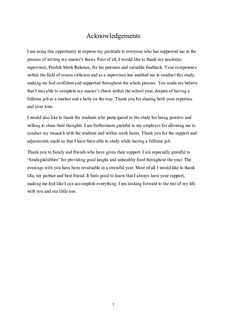| dc.description.abstract | This study investigates how Norwegian lower-secondary students perceive online source criticism in the English school subject. Due to digitalization and the increased access to information, online source criticism can perhaps be perceived as one of the most important competences in today’s society. Schools and teachers have a particular responsibility in developing this competence amongst students, but there is little research that targets online source criticism in compulsory education in Norway and internationally. Hence, this study aims to produce new research-based knowledge about online source criticism in a school context.
The main objective of this study is to give insight into what knowledge and level of reflection 8th graders hold within the field of online source criticism when starting lower-secondary education. I have carried out a research project with my own English students as participants, focusing on their use of online sources during a writing task in connection to the 2016 American presidential election. This is a qualitative and phenomenological study where interview is the main data collecting method. Observation and document analysis have given additional data.
The main finding of the study was that the students seemed quite unsure in the field of online source criticism. They had difficulties defining the term and it was a challenge for them to give concrete examples of how they assess a webpage’s trustworthiness. None of the students seem to have received the training they should have during elementary school in terms of the competence aims in the curriculum and the ICT-plan. In the interviews, most of the students express skepticism towards both online newspapers and Wikipedia. However, the observation and the document analysis showed that these sources were the most used in the written task. Another key finding was that all the students used Google as their search engine, wrote quite general keywords and used little time in their process of searching for online sources to be used in their written work.
This study contributes to research in the field of online source criticism within a school context. The findings of the study may contribute to improved practice in English and other subjects. In addition, it might give valuable input to those who have an impact on the development within the field of online source criticism in the Norwegian school. | nb_NO |
